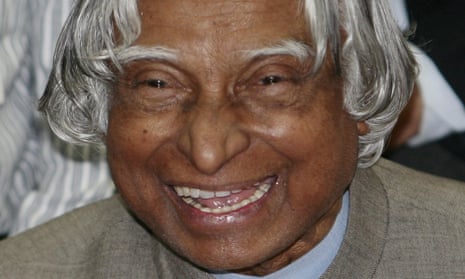The president of India is constitutional head of state, an office in many ways similar to the British crown. Like British monarchs, Indian presidents are housed in a vast palace and usually surrounded by stifling ceremonial. APJ Abdul Kalam was an extraordinary president of India, in office from 2002 until 2007. He became known as the “people’s president” because he welcomed the public into the palace in New Delhi (built for the last of the viceroys by the British architect Sir Edwin Lutyens) and made himself accessible whenever he travelled. Kalam, who has died aged 83, was unusual, too, in that he never held any political ambitions.
He was also an extraordinary scientist, known as the “missile man”, who played a crucial role in India’s most successful programmes. In the words of one of his former colleagues: “The success of our space programme, our missile development and our nuclear weaponry all owe their genesis to him.” Yet he had studied aeronautical engineering at the Madras Institute of Technology when it was a technology college, not a university, and never took a postgraduate degree.
Son of Jainulabdeen and Ashiamma, Kalam was born in the small temple town of Rameswaram on the southern coast. His father, who owned a boat, had no academic qualifications but was deeply interested in religion; a Muslim himself, he used to hold regular meetings in his house with a Christian and a Hindu priest. Kalam said it was from their discussions that he learned what he called “true secularism”.
He went to a Catholic school, St Joseph’s college, in another southern temple town, Tiruchirappalli, formerly Trichinopoly. He studied physics there, but was not an outstanding student. After leaving the Madras Institute of Technology in 1960, he joined the Defence Research and Development Organisation, and his subsequent scientific career was spent in government research organisations. In most of these, scientists are hampered by bureaucratic procedures and political interference. Kalam developed the skill of protecting his scientists without falling out of favour.
He held a series of prestigious posts, including project director for India’s first indigenous satellite launch vehicle, and chief of the integrated guided missile development programme. From 1992 until 1999 he was chief scientific adviser to the prime minister and the defence minister. In 1998 he was the chief project co-ordinator for India’s second nuclear test. The year before that he was awarded the Bharat Ratna, India’s highest civilian honour.
In 2002 there was a disagreement between the two biggest political parties, the rightwing Hindu Bharatiya Janata party, or BJP, which was in power, and the Nehru-Gandhi family’s Congress party, over the choice of politician to be elected president. The then BJP prime minister, Atal Bihari Vajpayee, broke the logjam by offering the presidency to Kalam. The Congress realised they could not object to him.
Kalam took his duties as president extremely seriously. Under the Indian constitution, all bills have to be approved by the president before they become acts. Kalam scrutinised all those sent to him carefully and in 2006 rejected one allowing parliamentarians to hold paid public positions.
A controversy had arisen engulfing, among others, the Congress party president and MP Sonia Gandhi, widow of the former prime minister Rajiv Gandhi. The bill had been hastily prepared to find a way out of the difficulty and a committee Kalam had set up to advise him maintained that it was unconstitutional. But when the bill was returned to him, he signed, because he did not have the power to reject it twice. Later he said that signing the bill had been the hardest decision of his presidency.
The presidency did not change him. He kept his long hair, which curled round his forehead – a close friend of his told me he had it cut only twice a year. He found time for his own pursuits, including playing the rudra-veena, an Indian classical instrument.
After his retirement Kalam remained a public figure, accepting invitations from all over India to speak, particularly to students and children. Throughout his time in office he had sought to make the presidency relevant to young people, and afterwards spoke of himself as a teacher.
Kalam is survived by a brother.

Comments (…)
Sign in or create your Guardian account to join the discussion